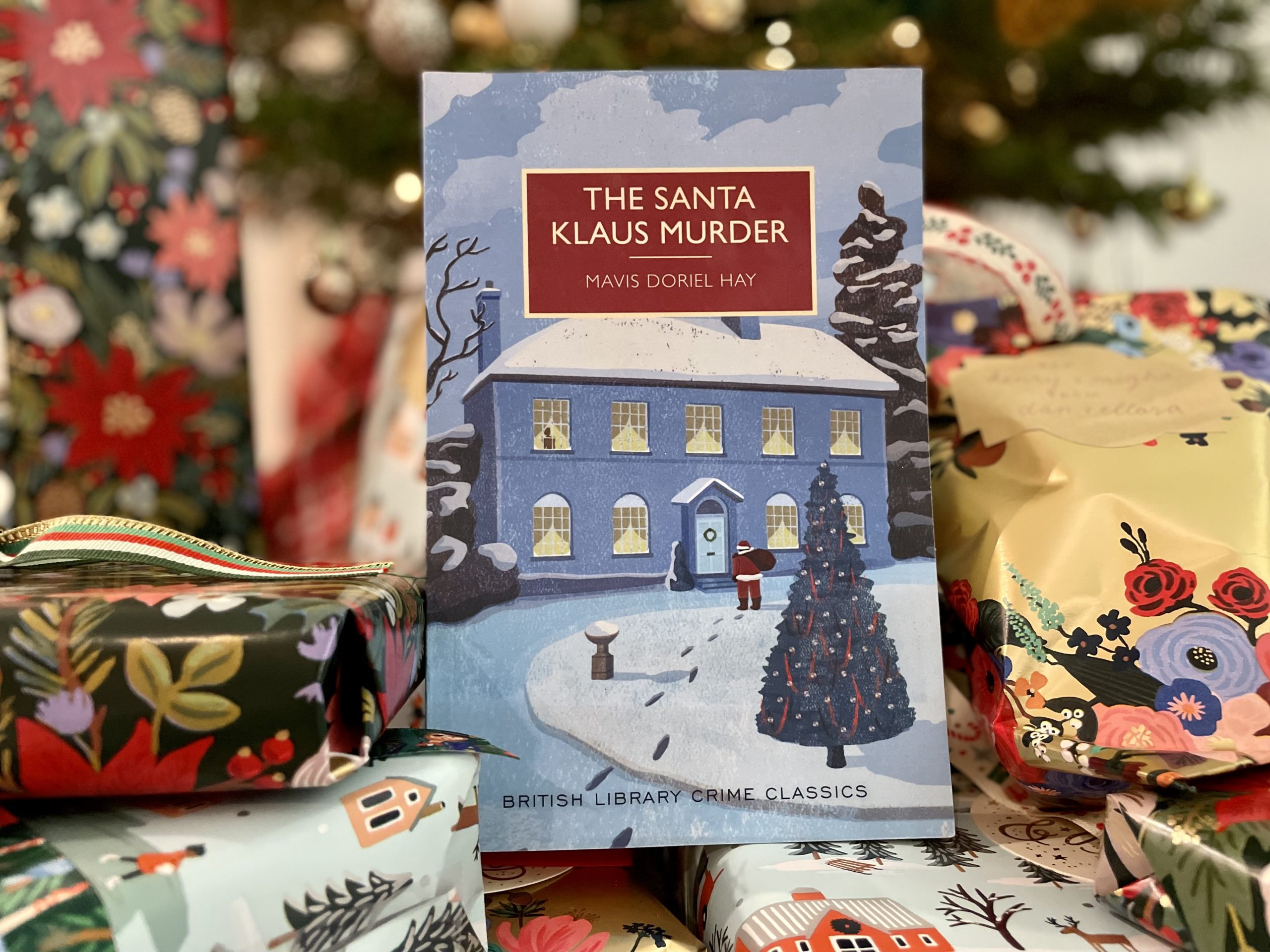So far, many of the the stories this week have been Christmas-adjacent. (Somehow, even having Christmas in the title is not enough to guarantee a Christmas-centric timeline.) That ends today. From here on out, it is straight manor house closed-circle mysteries that take place on Christmas. Some poor unfortunate soul invites a bunch of friends and family home, and they repay his hospitality with murder. It can’t be much more of a “Christmas murder” than this.
Multiple perspectives on a Christmas crime
We’ll start with what many consider to be the original Christmas Mystery Novel, The Santa Klaus Murder by Mavis Doriel Hay. First published in 1936, The Santa Klaus Murder follows the Christmas celebration of the Melbury family. The family patriarch, Sir Osmond Melbury, is a domineering man and is determined to control every aspect of the festivities. When his body is discovered on Christmas Day by a guest dressed as Santa Klaus, it’s up to the police – and a helpful insider – to uncover the truth.
Reading The Santa Klaus Murder is an interesting exploration into the origins of the Christmas murder. Some of the main features of the genre – the manor house, the disgruntled family, the terrible timing, the ironic Santa Claus outfit – clearly take their origins here. But other structural elements are unique to this novel.
Specifically, the novel features both an epistolary format and an unusual collaboration between an amateur and the police. These two features are linked – the amateur, a friend of the family, requests that specific individuals share their written accounts of the events preceding and immediately following the crime. Each takes the opportunity to cast aspersions on other members of the holiday party, and it’s fun to read through their accounts and try to match them up.
These unique elements do their job of obfuscating the elements of the mystery, almost too well. While there are just enough nods to the solution to make this story a fair one, it definitely tiptoes right up to the line. This mystery feels like it might do better as a screen adaptation, where it might be easier to get the balance of information right (while enabling some potentially interesting scenes based on the multi-perspective concept).
The highs and lows of family festivities
As you might expect from a novel called The Santa Klaus Murder, the Christmas vibes are strong. (Or maybe not? We’ve already fallen into the title trap once). But the theme spans the entirety of the Christmas experience, including the tension off reuniting with a family that doesn’t get along so well. The book is a kind of bleak reminder of the best and worst parts of Christmas, from the lows of family dynamics to the highs of a bright celebration, and everything in between.
Doriel Hay clearly wants to end the novel with the Christmas spirit, and there’s an adventurous car-chase and a climactic moment or two. Unfortunately, the success of the scene – and the denouement – relies on the likability of the protagonists. And while the epistolary format creates a fun new twist of the mystery, it also reveals the worst possible take on each of the cast. It’s hard to root for them (and their holiday joy) when you don’t really like them very much.
An interesting first take on the Christmas Country House genre
Overall: Am I glad I read this? Yes. Will I read it again? Probably not. I didn’t love the characters and didn’t love the mystery. While it has been really cool to explore this piece of Golden Age mystery history, this will probably not return to my reading list in the future.
Read this if:
- You’re intrigued by the historical relevance or the epistolary format
- You’re feeling more generous than I am with unlikeable characters in a holiday read
- You LOVE family drama
Skip this if:
- You dislike stories told from multiple perspectives
- You’re looking for a more cheerful Christmas read
- You really care about “fairness” in your mystery novels
Random reading notes:
- It’s the start of the random Santa Claus costumes. It’s kind of sweet how many authors felt it was totally normal to have people literally dress up as Santa to hand out presents.
- On the topic of Santa – apparently “Father Christmas” was a wartime thing because “Klaus” was deemed too German?
Coming up next: another country house mystery, with even more Santa Clauses. (Santas Claus?) Until then – stay cozy, and stay curious!
